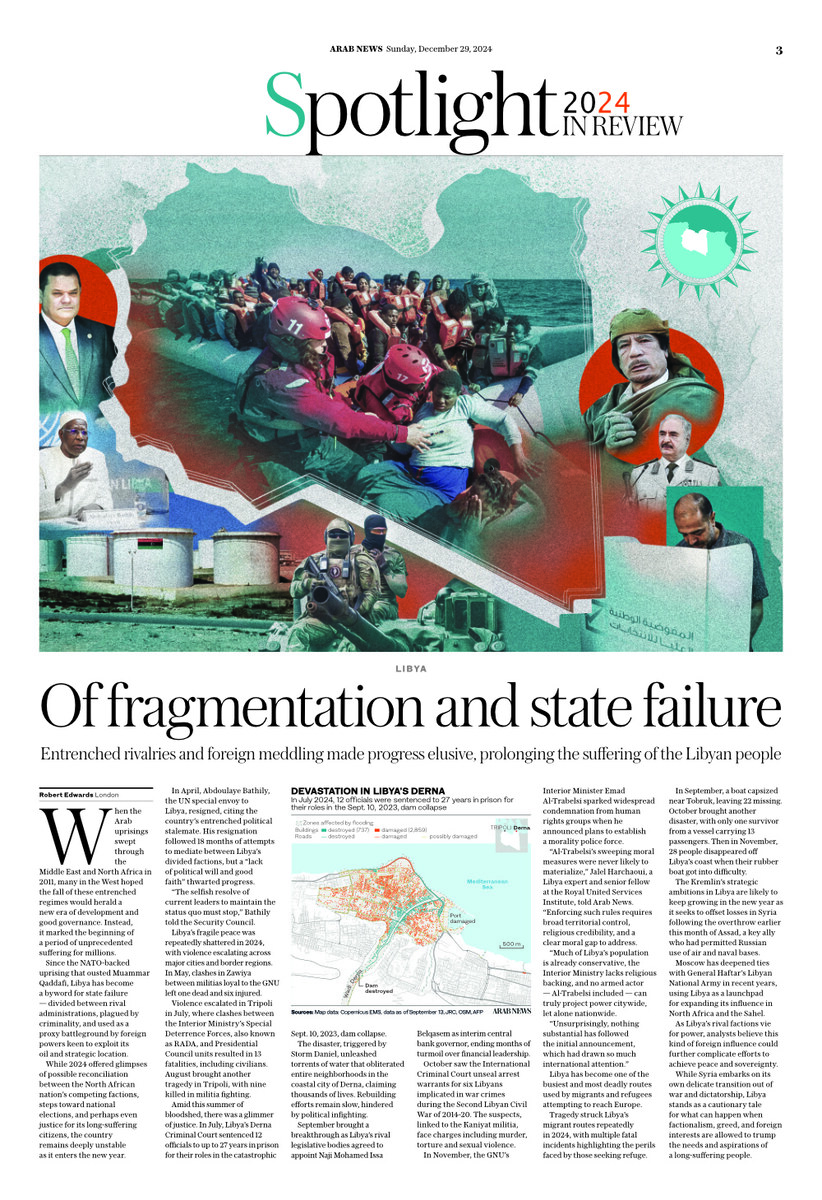LONDON: When the Arab uprisings swept through the Middle East and North Africa in 2011, many in the West hoped the fall of these entrenched regimes would herald a new era of development and good governance. Instead, it marked the beginning of a period of unprecedented suffering for millions.
Nearly 14 years later, in the wake of a grinding civil war, there are now renewed hopes that Syria, after its brutally suppressed uprising, might finally be stepping into the light following the toppling of the Bashar Assad regime.
However, as a diverse array of victorious armed opposition groups struggle to impose order and unity on a fractured nation, many observers share a common fear — that Syria could become another Libya.

In this Nov. 3, 2008 file photo, Libyan leader Moammar Gadhafi attends a wreath laying ceremony in the Belarus capital Minsk. (AP)
Indeed, since the NATO-backed uprising that ousted Muammar Qaddafi, Libya has become a byword for state failure — divided between rival administrations, plagued by criminality, and used as a proxy battleground by foreign powers keen to exploit its oil and strategic location.
While 2024 offered glimpses of possible reconciliation between the North African nation’s competing factions, steps toward national elections, and perhaps even justice for its long-suffering citizens, the country remains deeply unstable as it enters the new year.
In April, Abdoulaye Bathily, the UN special envoy to Libya, resigned, citing the country’s entrenched political stalemate. His resignation followed 18 months of attempts to mediate between Libya’s divided factions, but a “lack of political will and good faith” thwarted progress.
“The selfish resolve of current leaders to maintain the status quo must stop,” Bathily told the Security Council. The delay of the national reconciliation conference, originally scheduled for April, highlighted the ongoing gridlock.
While Libya’s oil-rich economy offers immense potential, it remains plagued by a fractured political landscape — with the Tripoli-based UN-recognized Government of National Unity headed by Abdul Hamid Dbeibeh opposing the eastern administration allied with General Khalifa Haftar, commander of the Tobruk-based Libyan National Army.
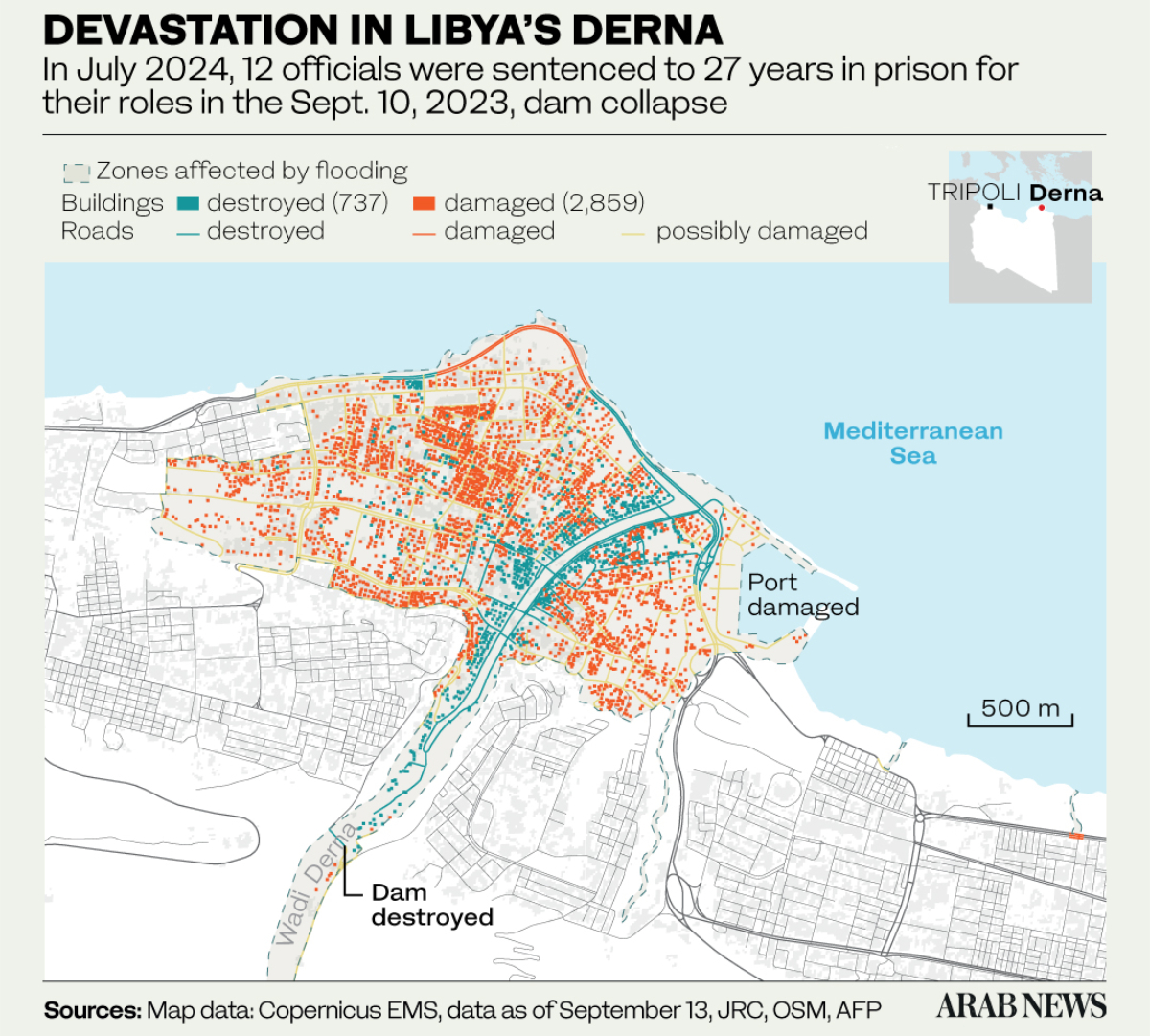
Bathily’s departure underscored the international community’s struggle to bring stability to a nation divided since the 2011 uprising. Despite his efforts, Libya’s entrenched rivalries and external meddling have kept progress elusive, prolonging the suffering of its population.
Libya’s fragile peace was repeatedly shattered in 2024, with violence escalating across major cities and border regions. In May, clashes in Zawiya between militias loyal to the GNU left one dead and six injured.
Violence escalated in Tripoli in July, where clashes between the Interior Ministry’s Special Deterrence Forces, also known as RADA, and Presidential Council units resulted in 13 fatalities, including civilians. August brought another tragedy in Tripoli, with nine killed in militia fighting.
Although political leaders have periodically called for ceasefires, the lack of cohesive state authority has allowed armed factions to exploit and perpetuate the chaos, leaving Libyans trapped in repeated cycles of violence.
Amid this summer of bloodshed, there was a glimmer of justice. In July, Libya’s Derna Criminal Court sentenced 12 officials to up to 27 years in prison for their roles in the catastrophic Sept. 10, 2023, dam collapse.
The disaster, triggered by Storm Daniel, unleashed torrents of water that obliterated entire neighborhoods in the coastal city of Derna, claiming thousands of lives.
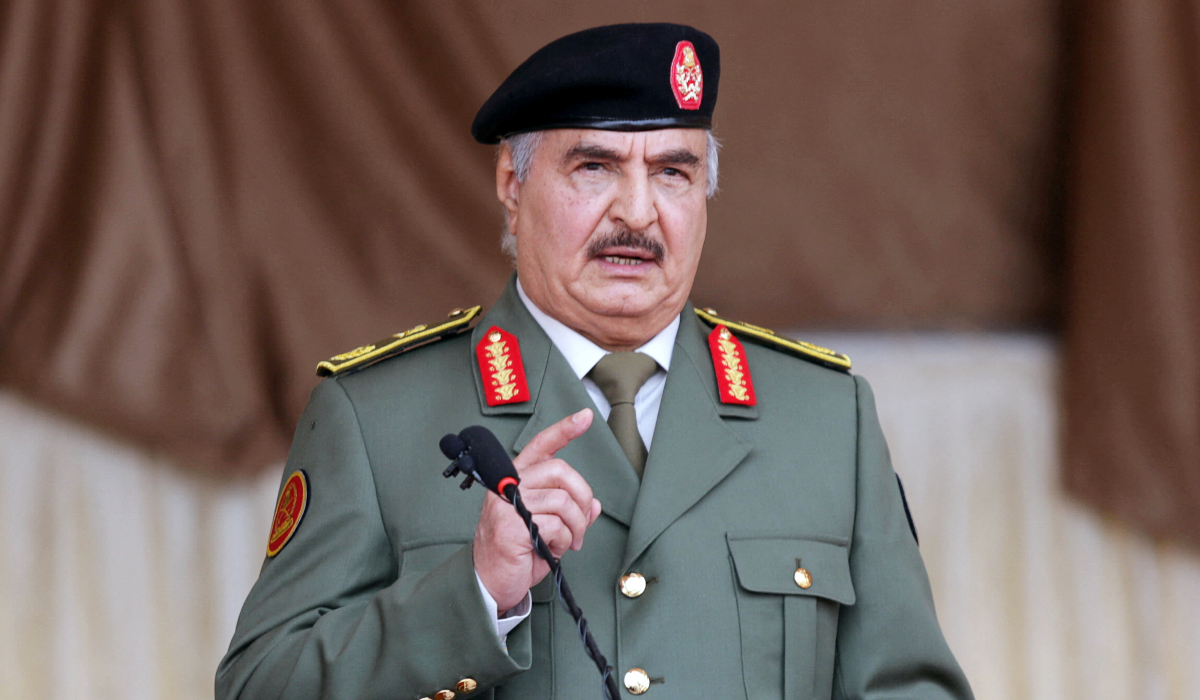
Libyan military commander Khalifa Haftar gestures as he speaks during Independence Day celebrations in Benghazi, Libya December 24, 2020. (REUTERS)
Neglected infrastructure and corruption were deemed key factors in the disaster, as funds earmarked for dam maintenance were found to have been misappropriated. The court’s verdict represented a rare moment of accountability in a nation fraught with impunity.
While some saw this as a step toward justice, critics argue systemic reform is still absent.
Rebuilding efforts in Derna remain slow, hindered by political infighting. Meanwhile, the disaster’s survivors, grappling with trauma and displacement, want to see comprehensive infrastructure upgrades to prevent future tragedies.
September brought a breakthrough as Libya’s rival legislative bodies agreed to appoint Naji Mohamed Issa Belqasem as interim central bank governor, ending months of turmoil over financial leadership.
This crisis erupted when Tripoli’s Presidential Council moved to replace longstanding Governor Sadiq Al-Kabir, leading eastern factions to halt oil production in protest.
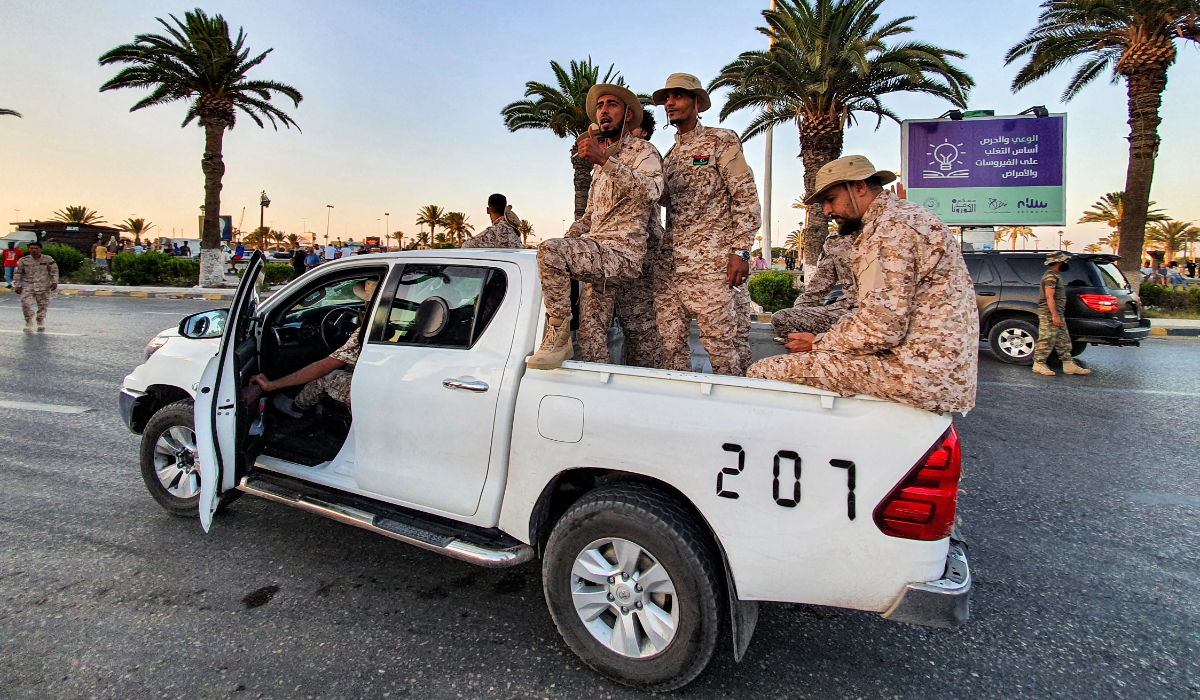
Members of the "Tripoli Brigade", a militia loyal to the UN-recognised Government of National Accord (GNA), sit in the back of a pickup truck as they parade through the Martyrs' Square at the centre of the GNA-held Libyan capital Tripoli on July 10, 2020. (AFP)
Libya’s oil-dependent economy suffered immensely, with crude exports plummeting from 1 million barrels per day in August to just 400,000 in September.
The UN facilitated the agreement, urging an end to unilateral decisions that deepen institutional divisions. While the resolution temporarily eased tensions, it highlighted the broader issue of competing power centers undermining Libya’s economic stability.
With the interim governor tasked to form a board of directors, the deal’s success hinges on sustained cooperation, a rare commodity in Libya’s fragmented political landscape.
The murder of Abdel-Rahman Milad, a notorious Libyan Coast Guard commander known as “Bija,” in September spotlighted Libya’s lawlessness and corruption.
Sanctioned by the UN in 2018 for human trafficking, Milad symbolized the overlap of state and criminal enterprise.
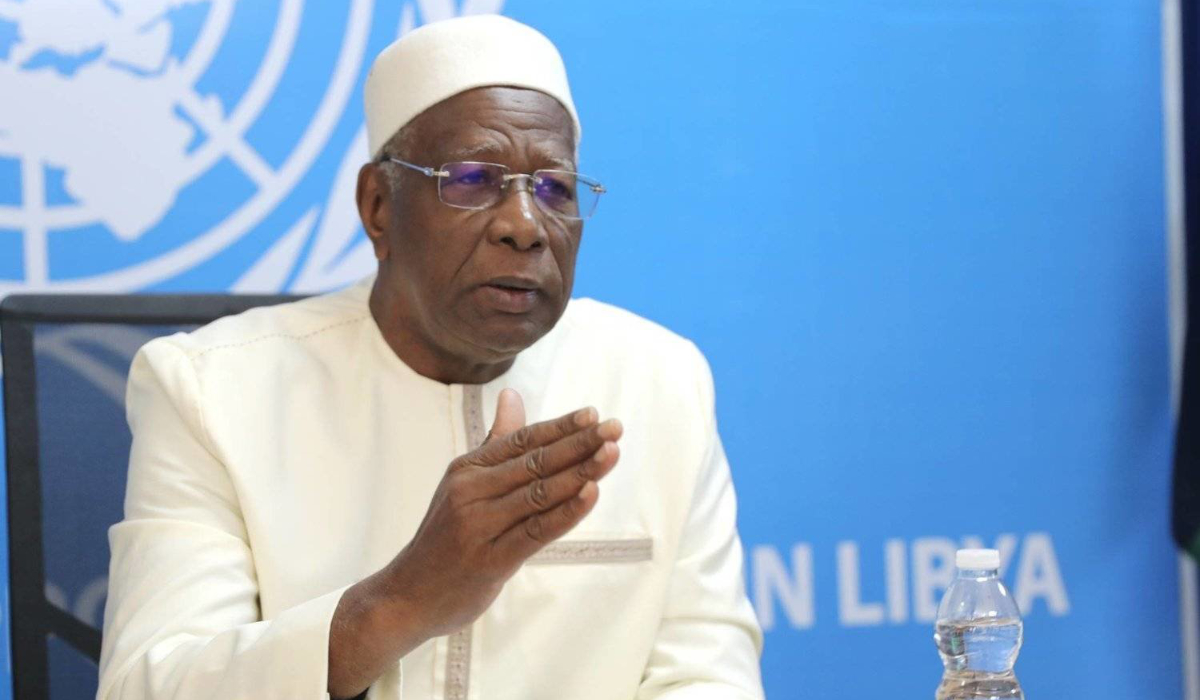
Abdoulaye Bathily, the UN special envoy to Libya. (X @Bathily_UNSMIL)
Speculation still abounds about the reason behind his killing — ranging from militia infighting to fears he might expose high-level corruption.
Milad’s killing also raised questions about the EU’s reliance on Libyan partners accused of human rights abuses to help control the flow of migration to Europe.
Observers see his death as a byproduct of power struggles between rival gangs and a reflection of Libya’s inability to reform its fractured governance and security apparatus.
While Milad’s death may serve as a test for Libya’s broken justice system, there has been some progress on addressing historic injustices.
October saw the International Criminal Court unseal arrest warrants for six Libyans implicated in war crimes during the Second Libyan Civil War of 2014-20. The suspects, linked to the Kaniyat militia, face charges including murder, torture and sexual violence.
These crimes occurred in Tarhuna, a town notorious for mass graves uncovered in 2020 after the militia’s retreat.
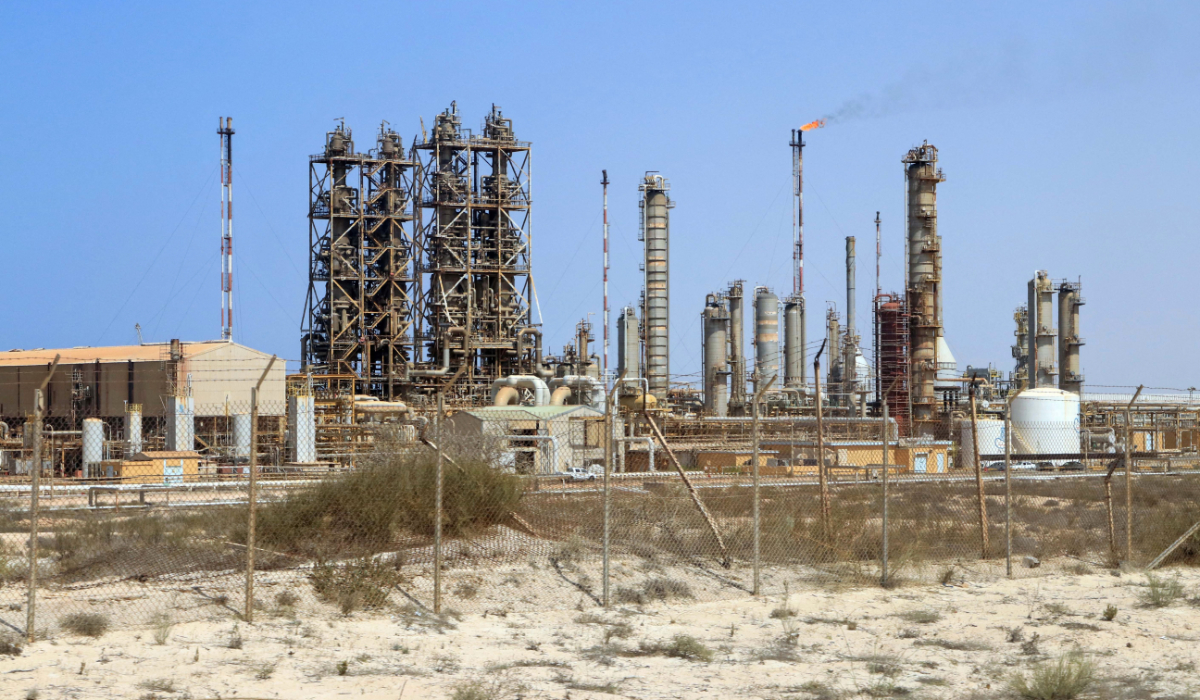
A picture taken on September 24, 2020 shows the Brega oil port some 270kms west of Libya's eastern city of Benghazi. (AFP)
The ICC warrants mark a significant step toward accountability and highlight ongoing international scrutiny of Libya’s human rights record. However, Libya’s weak judicial system and fragmented governance pose challenges to enforcing these warrants.
As families of victims seek closure, the outcome may set a precedent for addressing atrocities committed during Libya’s protracted conflict.
In November, the GNU’s Interior Minister Emad Al-Trabelsi sparked widespread condemnation from human rights groups when he announced plans to establish a morality police force.
The new force would enforce conservative social norms, including mandatory veiling for girls over the age of nine and restrictions on women’s mobility without a male guardian.
Al-Trabelsi justified the move as preserving “Islamic social values,” dismissing personal freedom as incompatible with Libyan society.
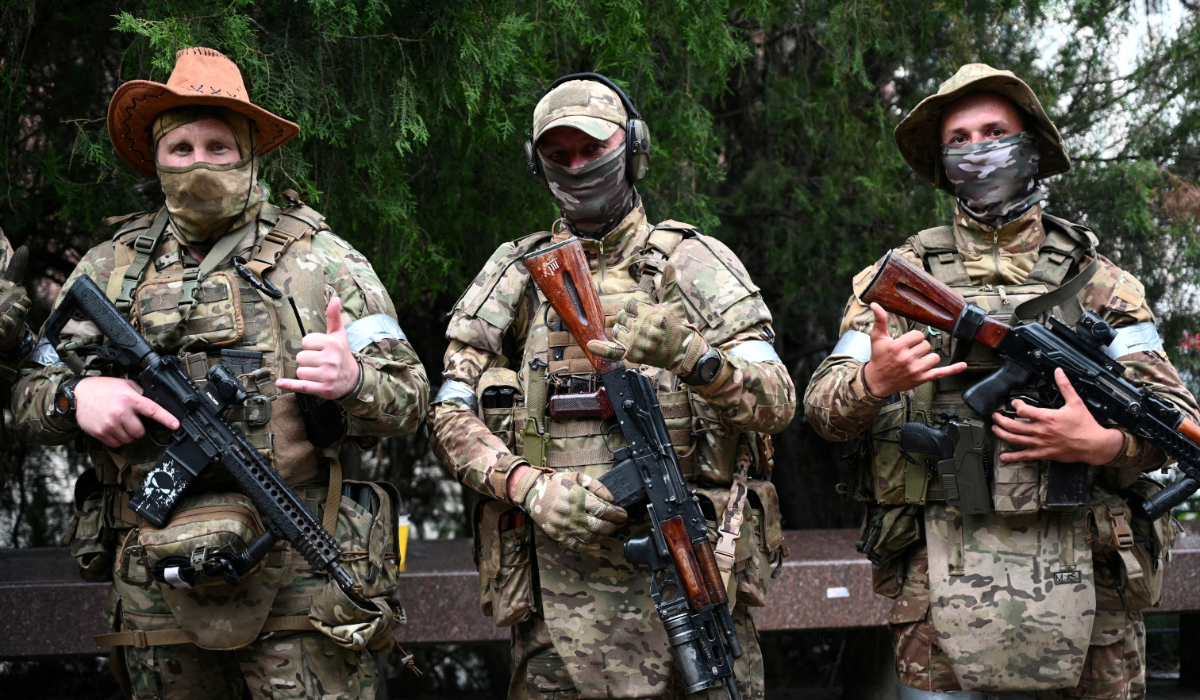
Fighters of Wagner private mercenary group pose for a picture as they get deployed near the headquarters of the Southern Military District in the city of Rostov-on-Don, Russia, June 24, 2023. (REUTERS)
However, the measures appear to have been slapped down by the GNU. There are also doubts that the government even has the means to enforce such rules.
“Al-Trabelsi’s sweeping moral measures were never likely to materialize,” Jalel Harchaoui, a Libya expert and senior fellow at the Royal United Services Institute, told Arab News. “Enforcing such rules requires broad territorial control, religious credibility, and a clear moral gap to address.
“Much of Libya’s population is already conservative, the Interior Ministry lacks religious backing, and no armed actor — Al-Trabelsi included — can truly project power citywide, let alone nationwide.
“Unsurprisingly, nothing substantial has followed the initial announcement, which had drawn so much international attention.”
While national elections intended to reunify the country have been repeatedly postponed, November’s municipal polls marked a rare democratic exercise, with voting held simultaneously in Libya’s east and west for the first time since 2014.
Despite logistical challenges and political tensions, voter turnout hit 77 percent, signaling public demand for stability. The elections even included areas previously under military control, where mayors had been replaced with appointees.
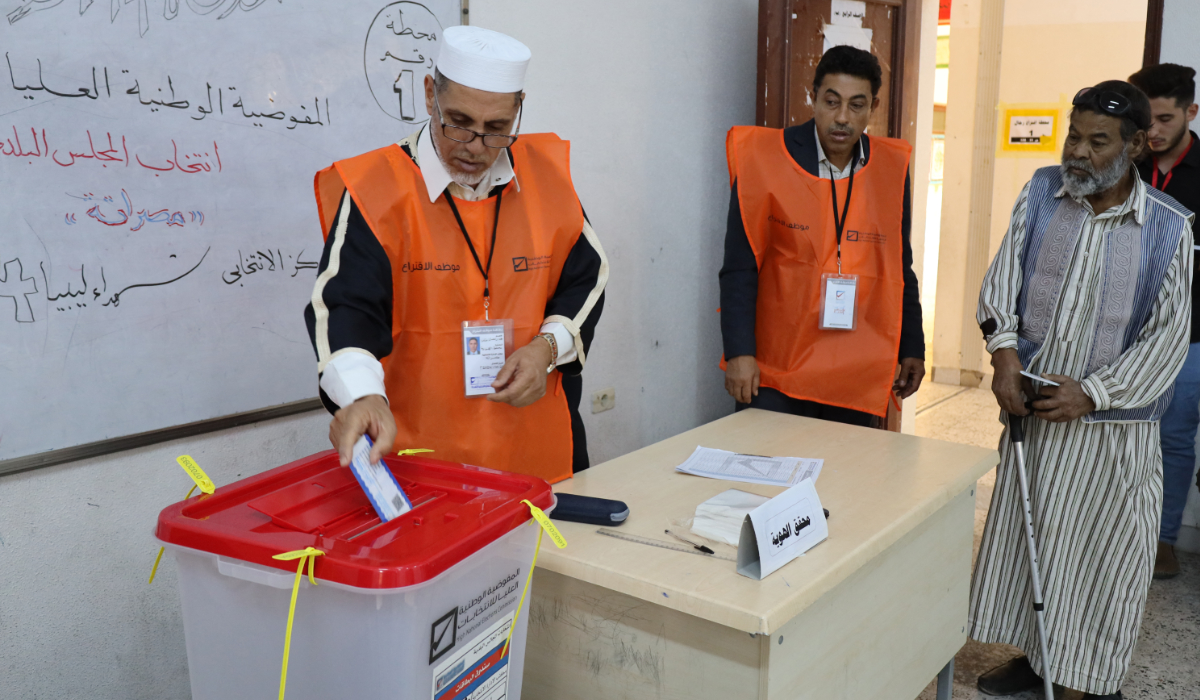
Libyans vote in the country's local elections in Misrata, Libya's third-largest city, on November 16, 2024. (AFP)
International observers, including the G7, praised the process as a step toward national reconciliation. However, skepticism remains about whether these local elections can pave the way for overdue presidential and parliamentary votes.
Libya has become one of the busiest and most deadly routes used by migrants and refugees attempting to reach Europe — something that armed groups have long facilitated for a profit or have sought to curtail, often brutally, in exchange for EU funding.
Tragedy struck Libya’s migrant routes repeatedly in 2024, with multiple fatal incidents highlighting the perils faced by those seeking refuge.
In September, a boat capsized near Tobruk, leaving 22 missing. October brought another disaster, with only one survivor from a vessel carrying 13 passengers. Then in November, 28 people disappeared off Libya’s coast when their rubber boat got into difficulty.
Rights groups criticized both Libyan and European policies that push migrants into perilous crossings. The Mediterranean remains a graveyard for those fleeing violence and poverty, with international efforts to address the crisis falling short.
The Kremlin’s strategic ambitions in Libya are likely to keep growing in the new year as it seeks to offset losses in Syria following the overthrow earlier this month of Assad, a key ally who had permitted Russian use of air and naval bases.

Handout picture taken and released on July 5, 2019 by German migrant rescue NGO Sea-Eye, shows an overloaded rubber boat spotted by Sea-Eye in international waters off the Libyan coast. (AFP)
Moscow has deepened ties with General Haftar’s Libyan National Army in recent years, using Libya as a launchpad for expanding its influence in North Africa and the Sahel.
The Wagner Group, a Russian private military contractor recently rebranded as the Africa Corps, has established bases in southern Libya, supporting resource extraction and military operations across the continent.
Russia’s efforts to consolidate its presence in Libya align with broader objectives to counter NATO and secure Mediterranean access for its ships.
As Libya’s rival factions vie for power, analysts believe this kind of foreign influence could further complicate efforts to achieve peace and sovereignty.
While Syria embarks on its own delicate transition out of war and dictatorship, Libya stands as a cautionary tale for what can happen when factionalism, greed, and foreign interests are allowed to trump the needs and aspirations of a long-suffering people.
